Anki Review | The Best Flashcard App Ever? (FREE Decks Included)
Anki Review // Is It Really The Best App To Learn Chinese? (2023 Update)
Anki Review; 8.5/10
Anki won’t teach you a language. So it won’t teach you Chinese. It’s definitely not enough to get you fluent in a language alone. But what Anki does do is help you to memorise things by using flashcards, and it does so using a scientifically proven method that really works – trust us! (And its millions of other users).
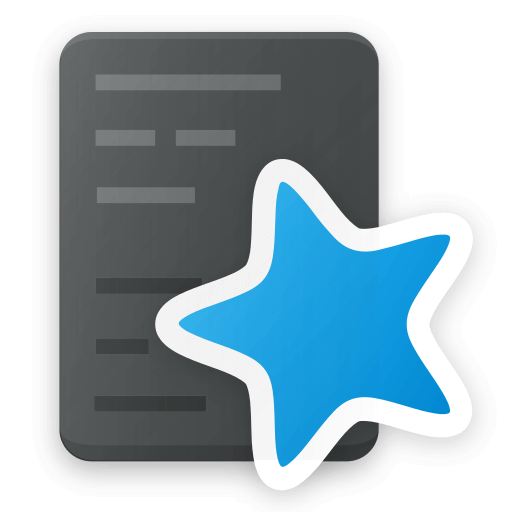
Update: 2023
Welcome to another app review blog! Today, our LTL Taiwan School Director, Alex shares with us his Anki Review.
As an avid language learner for many years, I have gone through many different methods of learning languages. I have also used many different software, apps and tools in many of my languages.
It is a guilty pleasure of mine in fact that whenever I tried out a new tool, to get the most objective results, I also started a new language using that tool.
This in turn resulted in me studying many different languages using many different tools.
Among the tools I’ve used, I’ve used Anki Flashcards the longest. The current statistics of my account show that I’ve been using it for 1132 days out of a total of 1488 days since I first started using it. So about 4 years now, as of December 2020.
As such, I believe I have reached a good understanding of the app and its methods to be able to give a relatively objective and comprehensive review of it.
Note; the below review is pretty extensive. Feel free to skip to the parts relevant to you using the chapters below!
Anki Review || Key Info
Anki Review || Pros & Cons
Anki Review || Costs
Anki Review || Introduction; What is Anki?
Anki Review || How does Anki work?
Anki Review || Who is Anki for?
Anki Review || Anki Customisation
Anki Review || My Method
Anki Review || What is Anki Good at?
Anki Review || Improvements Needed
Anki Review || Languages Offered
Anki Review || Conclusion
BONUS || Our FREE Anki Decks
Anki Review || Where to Download
Anki Review || FAQs
Anki Review || Key Info
| Name | Anki |
| Description | “Anki is a program which makes remembering things easy. Because it’s a lot more efficient than traditional study methods, you can either greatly decrease your time spent studying, or greatly increase the amount you learn.” (Anki) |
| Versions / Platforms | AnkiWeb / AnkiDroid / AnkiMobile |
| Website | https://apps.ankiweb.net/ |
| No. of Languages Offered | 48 (desktop)/ 14 (AnkiMobile) languages |
| Price | Free – $24.99 |
Anki Review || Pros & Cons
| ANKI PROS | ANKI CONS |
|---|---|
| 1. Customised resources available on both mobile and desktop. | 1. $24.99 for iOS users… Free for everyone else!? |
| 2. Scientifically proven method of studying and memorisation. | 2. Can be a bit overwhelming for new users. |
| 3. Massive database of user-generated content, made all the better by the sheer amount of users they have (millions!) | 3. App interface could be improved. |
BOTTOM LINE: Anki is a well-designed app that works from using flashcards to help you memorise things (and doesn’t stop at just languages, by the way!). It’s generally free and has a massive database of user-generated content.
Anki Review || Costs
AnkiApp is free for android. It costs $24.99 USD on iOS.
We discuss this issue further below…
Anki Review // What is Anki?
Anki was originally created as an online flashcard website by developer Damien Elmes back in 2006.
Originally, the app was not even an app, but rather just a website where people could sign up for an account, enter their own flashcards in their own decks, and review them.
Since then, Anki has grown to have a huge following, with apps both for iOS and Android devices (called Ankidroid). They’re even having clones of it made by other developers!
The app as it stands is completely free both on the computer and on Android devices, with a somewhat hefty cost on iOS devices, price at 25$ USD. This is the one that I have.
As the app works based on an account, all information can be synced between the various devices one has with relative ease.
Anki Review // How does Anki Work?
In essence, Anki is a Flashcard app that uses Spaced Repetition System (SRS).
As one begins using it, one would normally create a deck for information one would like to learn.
This means you can use the app not only for learning languages, but also any other topics you might be interested in.
Once you have created a Deck with questions and answers (or “Front” and “Back” as it would normally be called in Anki), the system will allow you to review the Cards in the Deck.
It will show you the question first, and once you tap again, show you the answer.
On the answer page, it gives you the option to let it know whether you got the answer right easily, with some difficulty or didn’t get it at all.
The above is the main crux of the SRS method, based on the option you chose (Easy, Hard, Again). Anki will then place the same card to reappear later again based on a specific duration, for example, 3 days later, 1 day later or in 10 minutes, respectively based on your choice.
The more often you see the card and more often you get the correct answer, the farther away the next time the card reappears.
This allows you to strengthen your memory of the card by giving you bigger and bigger spaces in between repetitions, allowing your power of recall to become stronger.
Every day, you will have a certain amount of cards that are reviews of previous cards you’ve seen, and new cards that you haven’t seen before, but will start reappearing after their first appearance.
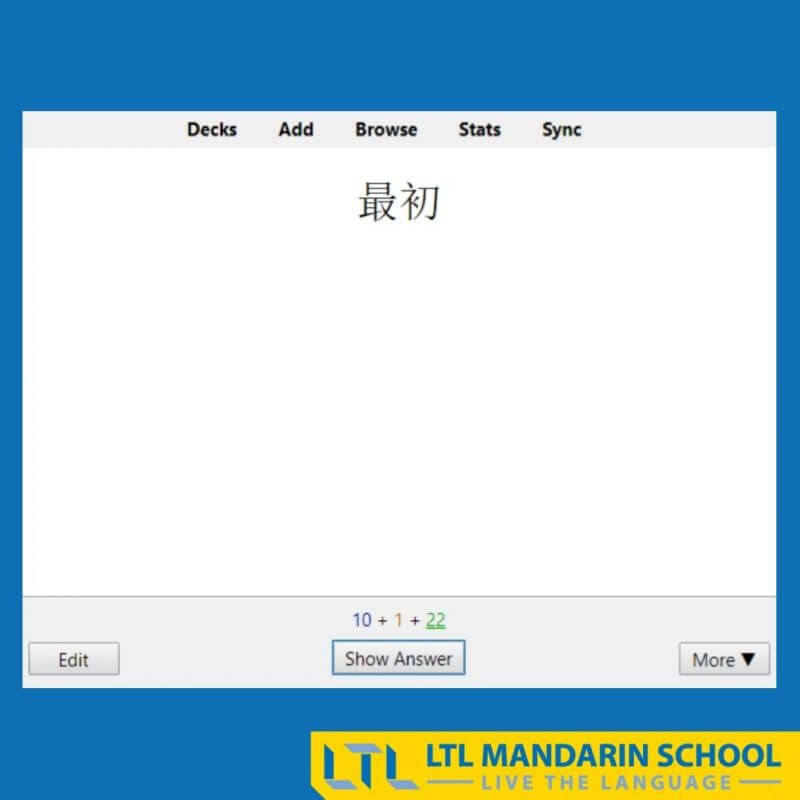
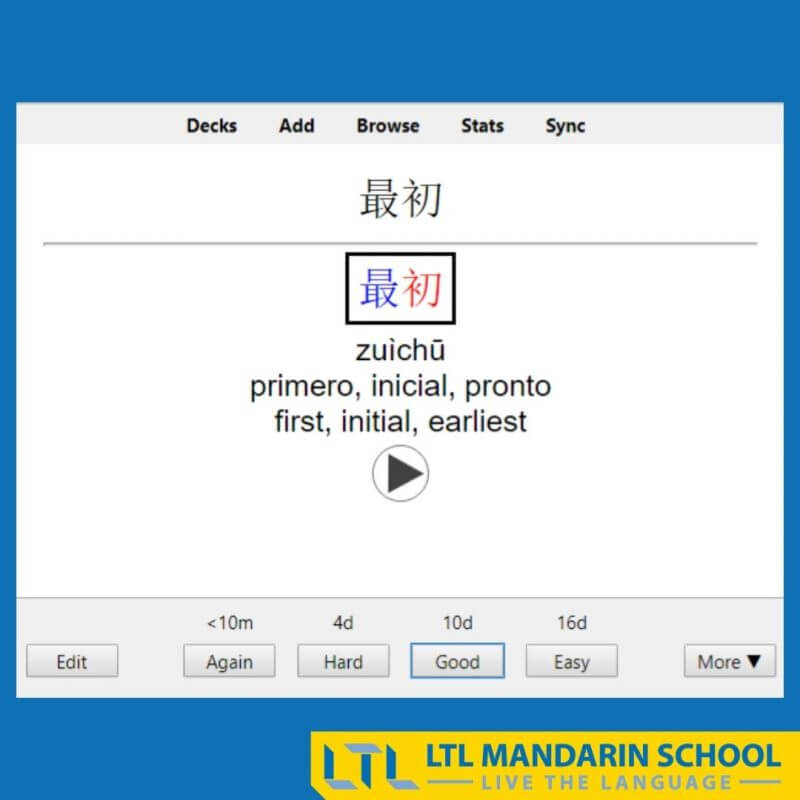
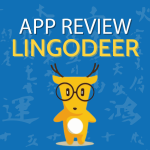
LingoDeer Review (2025) – One of the Most Complete Chinese Learning Apps
LingoDeer App Review: Should I Start Using LingoDeer this 2025? LingoDeer Review: 9.5/10With an intuitive interface and engaging exercises, LingoDeer is one of the few apps that really gets it right, succeeding in offering a complete, strong and effective set…
Anki Review // Who is Anki for?
Anki is built for all learners who wish to learn and memorize information that they want to focus on.
This is mostly great for specifically learning languages, as a language requires accurate memory of pronunciation and the exact sound of the word.
It however also works for topics unrelated to languages, such as if you are preparing for an important exam and need to cram a lot of information in advance.
Or, as an even more exaggerated example, cramming information for a quiz, such as the famous example of Roger Craig, who in 2010, obtained a record for single-day winnings in the TV show Jeopardy by using Anki to memorize a huge number of facts in preparation.

Memrise Review (2025) – Can You Learn Chinese Through Flashcards?
Memrise Review: Pros & Cons Memrise Review: 8/10I’ve used Memrise for over 10 years and over 10 languages. I can’t learn languages without it – but it’s not the only thing I use and Memrise certainly doesn’t provide an all-around…
Anki Review // Anki Customisation
Aside from the normal way Anki is used, the real aspect where Anki shines is its ability to allow for customisation.
This means that any person can create the cards exactly as he/she wants them to appear.
For example, instead of showing the question and answer, you can change it to show the answer and then the question.
Or for example, with a language like Chinese, you can customize Anki to show you the word in Hanzi characters only, and then show you Pinyin as the answer.
Alternatively, if you are practising reading Pinyin, you can have the cards appear as the Pinyin first and then as an audio file to listen to the exact pronunciation.
Based on this question and answer method and multiple fields you can separate by and show in one or the other side or both (for example, Chinese in Simplified Characters, Chinese in Traditional Characters, English, Chinese audio, English audio, Pinyin and even frequency of the word), the options for how you wish to make the flashcards your own is virtually limitless.
An even bigger gem in this whole process is that thanks to the big following Anki has online, people can share their cards with each other through the Ankiweb online database.
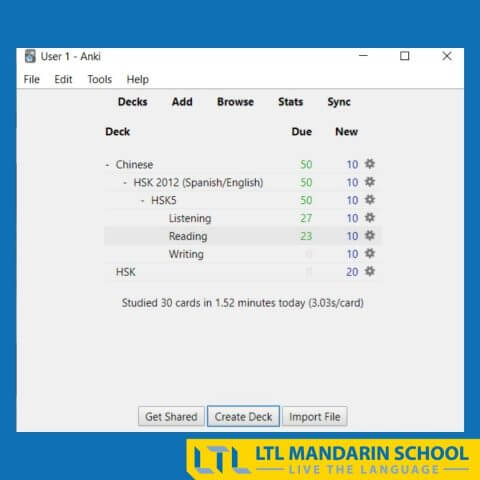
As such, everyone can enjoy lots of decks of loads of topics, languages and materials.
Aside from the shared decks, there are also many add-ons one can install into Anki to allow for special options and abilities.
Some of my favourite are the ability to auto-advance (question turns to answer and answer turns to the next card after a set amount of seconds), which I use to listen to the language and immerse myself in it.
Let’s not forget the Text-to-Speech (TTS) add-on! It gives an option to have different TTS sources, such as Google, OSX Speech, Microsoft and others read out your cards and save them as an audio file, which you can add to the deck.

Dong Chinese Review 💡 Your Next Vocabulary Tool
Dong Chinese Review // Find out more about Dong Chinese and their vocabulary-based exercises as we tell you what’s hot, and what’s not with Dong Chinese.
Anki Review // My Method
As I am a big proponent of listening to and realising patterns from common phrases and sentences. I use Anki mainly as a tool for repetitions and review of sentences.
For many of my languages, I collect them from Shared Decks created by other users, with some of them coming from the Tatoeba Project sentence database (https://tatoeba.org/).
For other less common languages, such as Taiwanese and Shanghainese, I have my teachers translate the English sentences into Taiwanese/Shanghainese and record those for me, so that I can review them later on.
In my case, as I am more of a fan of repetition over recall, I have Anki show me the full information (Target Language, Source Language and Audio of Target Language) in both the Front and the Back of the card. I simply review it over and over.
The more the cards appear, the better the sentence patterns get stuck in my head.
This results in me internalizing many of the sentence patterns, with many of them appearing in my head even if I don’t try to recall or remember them.
Using this method, I make sure to do 30 minutes every day of Taiwanese, and 30 minutes of random languages 5 times per week.
My aim is to reach 100,000 repetitions in total per each language I’m focusing on. So, that the language actually becomes part of me and the pattern sticks in my brain.

The Best Apps for Learning Chinese (Right Now)
Best Apps For Learning Chinese | Trying to improve your Chinese listening, reading, writing, speaking? These high tech apps for learning chinese will help.
Anki Review // What is Anki Good at?
Anki is a great tool and extremely popular for learning and practicing. However, it is far from perfect, and has some glaring issues.
Some of these might be fixed in the future, while others are inherent in its system, for which the learner would have to find other resources.
Anki is amazing for memory and improving recall. It is great for studying vocabulary, as well as answers to questions in quizzes and similar.
Thanks to its customisation, there is also a huge amount of material and resources already existing in all kinds of languages and topics that other users are studying.
I use the Shared Decks to find material for Hindi, Vietnamese, Indonesian and even Ukrainian, all of these being fairly well made.
Some of the more common languages have huge amounts of data, such as the German and Russian Sentence decks, taken from the aforementioned Tatoeba project, that have more than 50,000 sentences in one deck.
Anki Review // What is Anki Bad at? (Improvements)
Anki still lacks some usability features that users would have liked to have.
For example, as I mentioned, I prefer repetition over recall.
As such, I would have preferred each card to appear with both the Front and the Back together, instead of double-tapping each time to pass to the next card.
This is not something that can be changed using an Add-on, as the question and answer method is a key feature of Anki.
Likewise, one finds that Anki can not be used alone for languages, where you do not have a basis or can use another language as a crutch.
For Ukrainian, I can guess quite easily which words is which when comparing to the English sentences, as I speak Russian.
However, I cannot do the same for example with Hindi or Berber, where I do not know which word means which word when comparing sentences, as I do not have other languages that help me connect.
Anki does not currently have an option where I could click on one of the words and see a definition of just that word alone, similar to what Duolingo for example has, when it shows you a fixed phrase.
A third issue with Anki is its business model.
Having no charge for computer and Android devices, but charging an extremely high price for the iOS option creates an issue where people who do not have experience with Anki choose not to try it out because of such a high price. Which actually comes with a high risk (“What if I buy and download it, and find out that it’s not suitable for me?”).
25$ is a lot of money for an app, when people are used to most apps costing a max of 5$.
This hits the nail on the head even more, when you do choose to download the app (or even the computer version) and it appears empty.
A user with no experience with Anki might not know how to create their own decks or download Shared ones just yet, and is lost due to the lack of instruction.
Noted, Anki does have a user manual on their website. However, it is so detailed and drawn out that the opposite effect might happen, where new users will treat it the same way they treat the Terms and Conditions lists of software: “Ain’t no one got time for dat!”.
As a result, Anki has a very steep adoption curve, where the only people who would indeed download and use it would be people who are already sold on its idea and know the basics of its use through either instruction by friends or experience through the computer interface.
In our mobile age however, most iOS mobile users cannot be bothered to accept an incubation and learning period through their computers before they get to “graduate” to the mobile app.
Anki Review // Languages Offered
Anki currently offers 48 languages on the desktop version and 14 on the mobile app.
| Desktop (48) | AnkiMobile (14) |
|---|---|
| Afrikaans | English |
| Arabic | Arabic |
| Armenian | French |
| Basque | German |
| Bulgarian | Irish |
| Catalan | Japanese |
| Simplified Chinese | Persian |
| Traditional Chinese | Polish |
| Croatian | Portuguese |
| Czech | Russian |
| Danish | Simplified Chinese |
| Dutch | Spanish |
| English (United Kingdom) | Traditional Chinese |
| English (United States) | Turkish |
| Esperanto | |
| Estonian | |
| Finish | |
| French | |
| Galician | |
| German | |
| Greek | |
| Hebrew | |
| Hungarian | |
| Irish | |
| Italian | |
| Japanese | |
| Korean | |
| Latin | |
| Lojban | |
| Malay | |
| Mongolian | |
| Norwegian | |
| Occitan | |
| Persian | |
| Polish | |
| Portuguese | |
| Brazilian Portuguese | |
| Romanian | |
| Russian | |
| Serbian | |
| Slovak | |
| Slovenian | |
| Spanish | |
| Swedish | |
| Thai | |
| Turkish | |
| Ukrainian | |
| Vietnamese |
Anki Review // Conclusion
In summary, Anki is amazing tool that can be used to extreme effect.
It is definitely one of the best apps out there for learning not just languages, but really anything.
However, its developers not being the best in terms of User Experience Design, it is quite hard to begin using it, as opposed to more friendly apps, such as Duolingo, Memrise and others.
Anki is a great tool, but only starts to shine when you know how to use it already.
Let us know what you think in the comment section!
See our FULL list of websites to learn Chinese.
BONUS // Anki Decks For You To Use
Here are the links to all the current LTL Anki Decks.
As you’ll see we don’t just cover Mandarin and the dialects of Chinese, but also a host of other languages including Vietnamese, Thai and even Mongolian!
We’ll continue to add to this list going forward.
Mandarin
- LTL Mandarin Deck Level 1 – Short | Download Here
- LTL Mandarin Deck Level 2 – Short Medium | Download Here
- LTL Mandarin Deck Level 3 – Medium | Download Here
- LTL Mandarin Deck Level 4 – Medium Long | Download Here
- LTL Mandarin Deck Level 5 – Long | Download Here
Cantonese
- LTL Cantonese Deck Level 1 – Short | Download Here
- LTL Cantonese Deck Level 2 – Short Medium | Download Here
- LTL Cantonese Deck Level 3 – Medium | Download Here
- LTL Cantonese Deck Level 4 – Medium Long | Download Here
- LTL Cantonese Deck Level 5 – Long | Download Here
Shanghainese
- LTL Shanghainese Deck Level 1 – Short | Download Here
- LTL Shanghainese Deck Level 2 – Medium | Download Here
- LTL Shanghainese Deck Level 3 – Medium Long | Download Here
- LTL Shanghainese Deck Level 4 – Long | Download Here
- LTL Shanghainese Deck Level 5 – Extra | Download Here
Taiwanese
- Taiwanese / Minnan / Hokkien Dialect Sentences | Download Here
Korean
- LTL Korean Deck Level 1 – Short | Download Here
- LTL Korean Deck Level 2 – Medium Short | Download Here
- LTL Korean Deck Level 3 – Medium | Download Here
- LTL Korean Deck Level 4 – Medium Long | Download Here
- LTL Korean Deck Level 5 – Long | Download Here
Japanese
- LTL Japanese Deck Level 1 – Short | Download Here
- LTL Japanese Deck Level 2 – Short Medium | Download Here
- LTL Japanese Deck Level 3 – Medium | Download Here
- LTL Japanese Deck Level 4 – Medium Long | Download Here
- LTL Japanese Deck Level 5 – Long | Download Here
Russian
- LTL Russian Deck Level 1 – Short | Download Here
- LTL Russian Deck Level 2 – Short Medium | Download Here
- LTL Russian Deck Level 3 – Medium | Download Here
- LTL Russian Deck Level 4 – Medium Long | Download Here
- LTL Russian Deck Level 5 – Long | Download Here
Vietnamese
- LTL Vietnamese Deck Level 1 – Short | Download Here
- LTL Vietnamese Deck Level 2 – Short Medium | Download Here
- LTL Vietnamese Deck Level 3 – Medium | Download Here
- LTL Vietnamese Deck Level 4 – Medium Long | Download Here
- LTL Vietnamese Deck Level 5 – Long | Download Here
Thai
- LTL Thai Deck Level 1 – Short | Download Here
- LTL Thai Deck Level 2 – Long | Download Here
Mongolian
- LTL Mongolian Deck | Download Here
Italian
- LTL Italian Deck Level 1 – Short | Download Here
- LTL Italian Deck Level 2 – Short Medium | Download Here
- LTL Italian Deck Level 3 – Medium | Download Here
- LTL Italian Deck Level 4 – Medium Long | Download Here
- LTL Italian Deck Level 5 – Long | Download Here
Spanish
- LTL Spanish Deck Level 1 – Short | Download Here
- LTL Spanish Deck Level 2 – Short Medium | Download Here
- LTL Spanish Deck Level 3 – Medium | Download Here
- LTL Spanish Deck Level 4 – Medium Long | Download Here
- LTL Spanish Deck Level 5 – Long | Download Here
French
- LTL French Deck Level 1 – Short | Download Here
- LTL French Deck Level 2 – Short Medium | Download Here
- LTL French Deck Level 3 – Medium | Download Here
- LTL French Deck Level 4 – Medium Long | Download Here
- LTL French Deck Level 5 – Long | Download Here
German
- LTL German Deck Level 1 – Short | Download Here
- LTL German Deck Level 2 – Short Medium | Download Here
- LTL German Deck Level 3 – Medium | Download Here
- LTL German Deck Level 4 – Medium Long | Download Here
- LTL German Deck Level 5 – Long | Download Here
If you like the Anki Decks we’ve shared we’d really appreciate a big thumbs up from inside the Anki app!

Anki vs Quizlet || Which is Better in 2025? *Plus a Bonus Recommendation*
When trying to learn Chinese vocabulary, flash cards are one of the best methods, so let’s put two of the most popular flash card apps to the test: Anki vs Quizlet.
Anki Review // Where to Download
The Anki app is available for apple and android;
Android
https://play.google.com/store/apps/details?id=com.ichi2.anki&hl=en_US&gl=US
iOS
https://apps.apple.com/us/app/ankimobile-flashcards/id373493387
Anki Review // FAQs
What is Anki?
Anki is an online flashcards website and app, allowing you to learn languages and many other topics.
It was originally created by developer Damien Elmes back in 2006.
How to use Anki?
At first you will need to create your own deck of flashcards.
Once you have created a Deck with questions and answers (or “Front” and “Back” as it would normally be called in Anki), the system will allow you to review the Cards in the Deck, showing you the question first, and once you tap again, showing you the answer.
Anki function with a Spaced Repetition System (SRS).
Where to download Anki?
You can download Anki from their website, or in the Google Play Store and Apple Store.
Can I study Chinese on Anki?
Yes, you can study Chinese on Anki.
You can learn new vocabulary with user created decks such as HSK based decks, for example.
Want more from LTL?
We offer a 7 day free trial to all new students where you can study Mandarin 24/7. Come and check it out free of charge and see what you think.
We also offer immersive Chinese courses in China. You can learn more about those here.
Sign up below and become part of our ever-growing community.
⭐ Download our free ebook, your starter pack of essential Mandarin learning resources!











15 comments
Excellent insight, will download
Thanks for the comment Paul
Anki is so good because you can make your own decks
We agree, a great way to learn James
Needs to improve it's design but no doubt the method is effective.
Fair comment!
Very good summary and I used your decks also, very useful
Thanks Hannah!
[…] Anki is amazing for memory and improving recall. It is great for studying vocabulary, as well as answers to questions in quizzes and similar. Thanks to its customisation, there is also a huge amount of material and resources already existing in all kinds of languages and topics that other users are studying. via […]
[…] Anki Review (for 2021) – The Best Flashcards App Ever? ???? […]
[…] Quote from the source: … […]
[…] Is Anki still the best? […]
[…] https://flexiclasses.com/anki-review/ […]
[…] it a habit to review and revise your sentence mining collection with Anki every day, ensuring long-term retention of what you’ve […]
[…] Anki is a powerful spaced repetition system that can significantly aid your memorisation and language learning efforts. […]